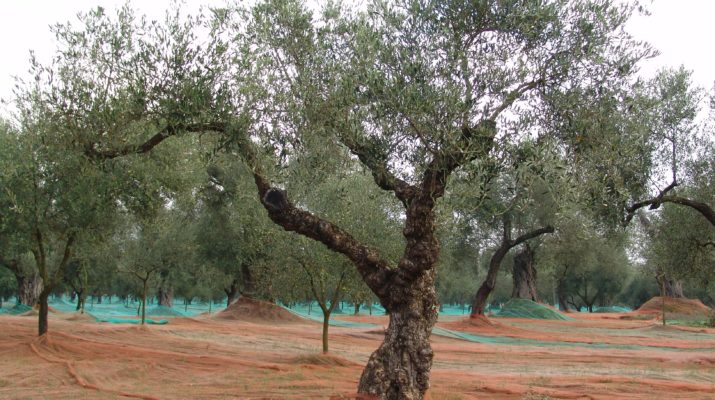Romans 11:13-24
A Women’s Lectionary – Fifth Sunday in Lent
13 Now I am speaking to you Gentiles.A InasmuchB then as I am an apostleC to the Gentiles, I glorifyD my ministryE
A “Gentiles” = ethnos. Probably from etho (a custom or culture). This is people who are united by having similar customs or culture. Generally, it is used to refer to Gentiles. This is a tribe, race, nation, or Gentiles in general. This is where the term “ethnicity” comes from.
B {untranslated} = men. This is truly, indeed, even, in fact. Often, it is not translated, but used to emphasize affirmation.
C “apostle” = apostolos. From apostello (to send, send away, send forth as a messenger, to commission); {from apo (from, away from) + stello (to set, arrange, prepare, provide for)}. This is a messenger – someone sent out on a mission as an envoy or delegate. It can also refer to someone set at liberty. Generally, this is a messenger who is meant to be a representative of the one who sent them. They are thus, set apart on a mission literally or figuratively.
D “glorify” = doxazo. From doxa (glory, opinion, praise, honor, renown; particularly used as a quality of God or manifestation of God – splendor); from dokeo (to have an opinion, seem, appear, suppose; a personal judgment; to think); from dokos (opinion). This is to render or hold something as glorious, to glorify, honor, magnify, or celebrate. This is ascribing weight to something by recognizing its true value or essence.
E “ministry” = diakonia. Perhaps from dia (through, across to the other side, thoroughly) + konis (dust) OR from dioko (to chase after, put to flight; by implication, to persecute or to purse like a hunter after its prey; this can be earnestly pursue or zealously persecute) {related to dio (put to flight)}. This is service, ministry, attending someone, service. It can mean serving someone at a table or otherwise as their servant/slave. It is also used for people who serve/minister in temples, as well as the work of Christian ministry. Figuratively, this word can mean money given for charity. This shares a root with “deacon” and is where the word “diaconate” comes from.
14 in order to make my own peopleF jealous,G and thus saveH some of them.
F “people” = sarx. May be from saroo (to sweep, cleanse by sweeping); from sairo (to brush off). This is flesh, the body, human nature, materiality, kindred. Flesh is not always evil in scripture (as when it refers to Jesus taking on a human body). However, it is generally used in a negative way for actions made selfishly and not through faith. This can mean animal flesh, i.e. meat, or refer to body in contrast to soul/spirit. Flesh can be a way of talking about how things or people are related or talking about human frailty (physical or moral).
G “make…jealous” = parazeloo. 4x in NT. From para (beside, by, in the presence of) + zeloo (jealous, eager for, burning with zeal, deeply committed, envy); {from zelos (eagerness or zeal on the one hand or rivalry and jealousy on the other; burning anger or burning love) perhaps from from zeo (to boil, be hot, ferment, bubble, boil, or glow; used figuratively for being fervent or earnest)}. This is to provoke to jealousy or anger.
H “save” = sozo. From sos (safe, rescued, well). This is to save, heal, preserve, or rescue. Properly, this is taking someone from danger to safety. It can be delivering or protecting literally or figuratively. This is the root that “savior” and “salvation” come from in Greek.
15 For if their rejectionI is the reconciliationJ of the world,K
I “rejection” = apobole. 2x in NT. From apoballo (to throw off, cast aside; figuratively, to lose or abandon); {from apo (from, away from) + ballo (to throw, cast, place, put, drop)}. This is a loss or casting away.
J “reconciliation” = katallage. 4x in NT. From katallasso (to reconcile, change, or exchange; a moment when two parties come together in reconciliation and both parties change because of it); {from kata (down, against, among) + allasso (to change, transform) {from allos (other, another; another of a similar kind or type)}. This is reconciliation or atonement.
K “world” = kosmos. Perhaps from the base of komizo (to carry, convey, recover); from komeo (to take care of). This is order, the world, the universe, including its inhabitants. Literally, this is something that is ordered so it can refer to all creation. It can also refer to decoration in the sense that something is better ordered and, thus, made more beautiful. This is where “cosmos” and “cosmetics” come from.
what will their acceptanceL be but lifeM from the dead!N
L “acceptance” = proslempsis. 1x in NT. From proslambano (to take aside, accept, receive, or welcome; to take in a friendly or hospitable sense or to eat (i.e. take food)); {from pros (at, to, toward, with) + lambano (active acceptance/taking of what is available or what has been offered; emphasizes the choice and action of the individual)}. This is a receiving or glad acceptance.
M “life” = zoe. From zao (to live, be alive). This is life including the vitality of humans, plants, and animals – it is life physical and spiritual and life everlasting.
N “dead” = nekros. Perhaps from nekus (corpse). This is dead of lifeless, mortal, corpse. It can also be used figuratively for powerless or ineffective. It is where the word “necrotic” comes from.
16 If the part of the dough offered as first fruitsO is holy,P then the whole batchQ is holy; and if the rootR is holy, then the branchesS also are holy.
O “part of the dough offered as first fruits” = aparche. 8x in NT. From apo (from, away from) + arche (origin, beginning, rule; can refer to the power of a magistrate or a king; it is the first thing as being the starting point or the most important); {from archomai (to begin or rule); from archo (to rule, begin, have first rank or have political power)}. This is first fruit or gift. It is the beginning of sacrifice – so the first crops of the season. It is also used figuratively of early converts in a specific location.
P “holy” = hagios. From hagnos (holy, sacred, pure ethically, ritually, or ceremonially; prepared for worship, chaste, unadulterated, pure to the core; undefiled by sin; figurative for innocent, modest, perfect). God is totally different from humanity and thus set apart. That which is consecrated to worship God (elements of worship) or to serve God (as the saints) are holy because they are now set apart for God’s purposes. Holy because important to God. This is sacred physically, pure. It can be morally blameless or ceremonially consecrated.
Q “whole batch” = phurama. 5x in NT. From phurao (to mis). This is something mixed together like bread dough or a lump of clay.
R “root” = rhiza. 17x in NT. This is a root literally or figuratively so it would be the root of what comes from it – shoot, source, descendant. This is where the word “rhizome” comes from.
S “branches” = klados. 11x in NT. From klao (to break in pieces as one breaks bread). This is a branch, twig, or bough. It can also refer to descendants.
17 But if some of the branches were broken off,T and you, a wild olive shoot,U were grafted inV their place
T “broken off” = ekklao. Related to “branches” in v16. 3x in NT. From ek (from, from out of) + klao (see note S above). This is to break off.
U “wild olive shoot” = agrielaios. 2x in NT. From agrios (related to the country or fields; natural, wild, or fierce); {from agros (a field as a place where one grows crops or pastures cattle; a farm or lands)} + elaia (the olive tree or that which it produces; can also refer to the Mount of Olives). This is a wild olive tree.
V “grafted in” = egkentrizo. 6x in NT. From en (in, on, at, by, with) + kentron (a sting or sharp point; figuratively, poison or death); {from kenteo (to prick)}. This is to graft in with a puncture.
to shareW the richX root of the olive tree,Y, Z
W “share” = sugkoinonos. 4x in NT. From sun (with, together with) + koinonos (partner, companion, partaker, sharer); {from koinos (common, shared, unclean, ritually profane); probably from sun (with, together with)} This is co-partner, someone with whom you share something together – a close companion.
X “rich” = piotes. 1x in NT. From pion (fat); perhaps related to pino (to drink in a literal or figurative sense). This is fatness or richness.
Y “olive tree” = elaia. Related to “wild olive shoot” in v17. 15x in NT. See note U above.
Z {untranslated} = ginomai. This is to come into being, to happen, become, be born. It can be to emerge from one state or condition to another or is coming into being with the sense of movement or growth.
18 do not boast overAA the branches. If you do boast, remember that it is not you that supportBB the root, but the root that supports you. 19 You will say, “Branches were broken off so that I might be grafted in.” 20 That is true.CC
AA “boast over” = katakauchaomai. 4x in NT. From kata (down, against, according to, throughout) + kauchaomai (literally holding one’s head high – to boast proudly or to glory, joy, exult, rejoice; can be boasting in a positive or negative sense); {perhaps from auchen (neck) OR from aucheo (to boast) + euchomai (to wish, request, pray to God)}. This is to boast over or exult over, to glory, rejoice, triumph over. It is lifting up or boasting over one thing at the expense of something else in a bad way. It can be false superiority or arrogance.
BB “support” = bastazo. Perhaps from the base of basis (step, hence foot; a pace); from baino (to walk, to go). This is to lift in a literal of figurative sense. It can also mean take up, carry, bear, or remove. Figuratively, it can mean declare, endure, or sustain.
CC “true” = kalos. From kalos (good, noble, beautiful, correct, or worthy; external signs of goodness like beauty, demonstrations of honorable character, showing moral virtues; a different word, agathos, speaks of intrinsic good). This is nobly, rightly, well-perceived, seen as appealing, morally pleasing, honorably.
They were broken off because of their unbelief,DD but you standEE only through faith.FF
DD “unbelief” = apistia. 11x in NT. From apistos (unbelieving, incredulous, faithless; someone who rejects faith); {from a (not, without) + pistos (faithful, trustworthy, reliable, sure, or true; a fullness of faith); {from peitho (to have confidence, urge, be persuaded, agree, assure, believe, have confidence, trust)}}. This is unfaithfulness, distrust, disbelief, disobedience.
EE “stand” = histemi. This is to stand, place, establish, appoint, stand ready, be steadfast.
FF “faith” = pistis. From peitho (see note DD above). This is less about knowing, believing, and repeating a list of doctrines then it is about trusting God. Faith means listening to God and seeking to live a holy life even (and especially) when we don’t understand how everything works or fits together. Faith is about being faithful (trusting and doing) rather than being all knowing.
So do not becomeGG proud,HH but stand in awe.II
GG “become” = phroneo. From phren (diaphragm, heart, intellect, understanding; figurative for personal opinion or inner mindset; thought regulating action; sympathy, feelings, cognition); perhaps from phrao (to rein in or curb). This is to think, judge, use one’s mind, have an opinion, shape one’s opinion through action. It refers to one’s insight or inner perspective expressing itself through behavior.
HH “proud” = hupselos. 12x in NT– in Matthew’s and Luke’s Temptation story as well as Matthew and Mark’s Transfiguration accounts. From hupsos (height, high position, heaven, dignity, eminence; elevation, altitude; to be exalted); from hupsi (on high, aloft); from huper (over, above, beyond). This is high, lofty, or exalted. It can be lofty in elevation or in character.
II “stand in awe” = phobeo. From phobos (panic flight, fear, fear being caused, terror, alarm, that which causes fear, reverence, respect); from phebomai (to flee, withdraw, be put to flight). This is also to put to flight, terrify, frighten, dread, reverence, to withdraw or avoid. It is sometimes used in a positive sense to mean the fear of the Lord, echoing Old Testament language. More commonly, it is fear of following God’s path. This is where the word phobia comes from.
21 For if GodJJ did not spareKK the naturalLL branches, perhaps he will not spare you.
JJ “God” = Theos. From Proto-Indo-European origins, meaning do, put, place. This is God or a god in general.
KK “spare” = pheidomai. 10x in NT. This is to spare, refrain, or to treat with leniency.
LL “natural” = phusis. 14x in NT. From phuo (to produce, spring up, grow, germinate; perhaps originally meaning puff or blow). This is inherent nature, origin, species, growth, descent, natural disposition, condition. It shares a root with the word “physical.”
22 NoteMM then the kindnessNN and the severityOO of God:
MM “note” = idou. From eido (to be aware, see, know, remember, appreciate). This is see! Lo! Behold! Look! Used to express surprise and or draw attention to the statement.
NN “kindness” = chrestotes. 10x in NT. From chrestos (useful, good, well-fitted, benevolent, kind, gracious; also a name given to slaves in the ancient world); from chraomai (to use, make use of, give what is needed, act in a specific way, request). This is properly useable, good or ready for service – just what one needs to meet real needs. Figuratively, this speaks of moral excellence, strong character, uprightness, kindness, integrity.
OO “severity” = apotomia. 2x in NT. From apo (from, away from) + apotomos (sharply, abruptly, severity); {from apo (from, away from) + temno (to cut)}. This is sharpness, abruptness, severity, or rigor.
severity towardPP those who have fallen,QQ but God’s kindness toward you, provided you continue inRR his kindness; otherwise you also will be cut off.SS
PP {untranslated} = men. Same as {untranslated} in v13. See note B above.
QQ “fallen” = pipto. This is to fall literally or figuratively.
RR “continue in” = epimeno. 17x in NT. From epi (on, upon, what is fitting) + meno (to stay, remain, wait, await, continue, abide, endure; to literally stay in a place or to remain in a condition; to continue with hope and expectation). This is to remain, terry, continue, or persevere. It denotes persistence in pursing a goal or task.
SS “be cut off” = ekkopto. 10x in NT. From ek (from, from out of) + kopto (to cut, strike, cut off; beating the chest to lament and so to mourn). This is to cut off, down, out, or away. It can also mean to remove, prevent, hinder, or frustrate.
23 And even those of Israel, if they do not persistTT in unbelief, will be grafted in, for God has the powerUU to graft them in again. 24 For if you have been cut from what is by nature a wild olive tree and grafted, contrary to nature, into a cultivated olive tree,VV how much moreWW will these natural branches be grafted back into their ownXX olive tree.
TT “persist” = epimeno. Same as “continue in” in v22. See note RR above.
UU “power” = dunatos. From dunamai (to be able, have power or ability). This is mighty or powerful. It speaks of ability of persons, possibility of things. It is what can be given the power or ability that the subject exhibits. The root verb is also related to miracles i.e. deeds of power.
VV “cultivated olive tree” = kallieliaios. Related to “true” in v20 & “wild olive shoot” and “olive tree” in v17. 1x in NT. From kalos (see note CC above) + elaia (see note U above). This is a cultivated olive tree.
WW “more” = mallon. This is rather, more than, or better.
XX “their own” = idios. This is something that belongs to you or that is personal, private, apart. It indicates a stronger sense of possession than a simple possessive pronoun. This is where “idiot” comes from (denoting someone who hasn’t had formal training or education and so they rely on their own understanding).
Image credit: “Olive Grove prunings in neat rows near Ostuni, Puglia, South Italy” by Ian Alexander, 2019.




